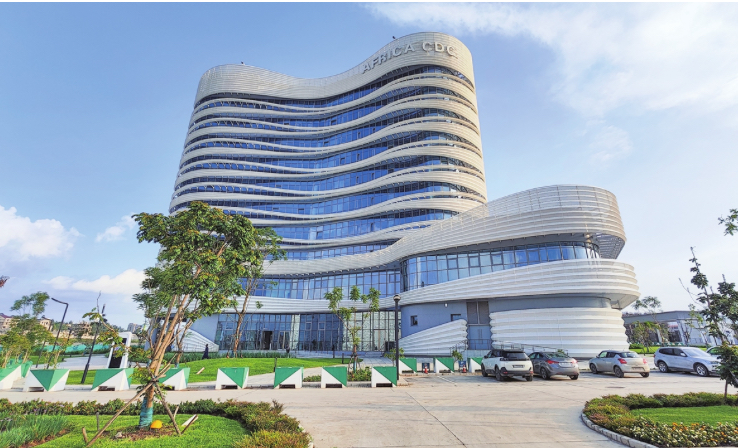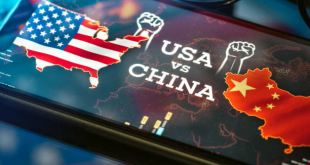Published: September 03,2024

Iconic Africa Centre for Disease Control (CDC) in Addis Ababa donated by China worth 80 million US Dollars
“Debt-trap” is a term to describe an international financial relationship where a creditor country or institution extends debt to a borrowing nation with the intention of extracting economic or political concessions when the debtor country becomes unable to meet its repayment obligations.
Western media have pinned the “Debt Trap” narrative on China since an Indian think tank coined the term in 2017. For instance, in an Associated Press article last year, reporter Bernard Condon alleged that China’s “debt trap” has pushed some developing countries, for example Kenya and Zambia, to the brink of collapse. He claims the debt is largely owed to China, with high interest that is hard to repay and little willingness from China to forgive it. However, what are the facts? Who is Africa’s number one creditor? Who is the one using a “debt trap” to plunder the wealth of developing countries, and who is offering a real helping hand? The vast majority of developing countries, especially African countries, know the truth.
Many academics, professionals and think tanks have asserted that China’s lending practices are not behind the debt troubles faced by borrowing nations, and that Chinese banks have been willing to restructure the terms of existing loans. “Only about nine percent of Kenya’s public debt can be attributed to China at the moment,” Adhere Cavince, an international relations specialist from Kenya, told Xinhua. The National Treasury of Kenya’s debt bulletin, published in April 2024, reported that more than half (51.5 percent) of the country’s external debt is owed to multilateral lenders like the World Bank and the International Monetary Fund (IMF). In contrast, China and other bilateral lenders account for only a fifth (21.5 percent) of Kenya’s bilateral debt.
A briefing paper titled “Integrating China into Multilateral Debt Relief: Progress and Problems in the G20 DSSI,” published by Johns Hopkins University, found that among the 46 countries participating in the Debt Service Suspension Initiative (DSSI) launched by the World Bank and the IMF, Chinese creditors accounted for 30 percent of all claims and contributed to 63 percent of debt service suspensions. In contrast to the unfulfilled promises of debt relief by the Western world, “China has been far more generous in providing relief to allow for African countries to manage their post-COVID recovery,” said Charles Onunaiju, director of the center for China studies in Nigeria. “China’s approach to debt relief has been more flexible, often involving the restructuring of loans to provide breathing space for debtor countries,” said Humphrey Moshi, director of the center for Chinese studies at the University of Dar es Salaam in Tanzania. “In contrast, other creditors have been more rigid, prioritizing their financial returns over the economic recovery of African nations.” “The ‘Debt Trap’ narrative aims to discredit China’s growing influence in Africa and to maintain Western dominance,” Moshi said. “It is neither in the interest of emerging economies nor that of China,” Cavince said. “That is why, despite the hype, no African country is taking it seriously.”
The COVID-19 pandemic has underscored the value of China’s infrastructure projects, which have improved connectivity, lowered logistics costs, and provided essential healthcare facilities, said Moshi, describing China’s investment in infrastructure as “groundwork for long-term sustainable development in Africa.” “Investments in education and vocational training have also empowered local populations by enhancing skills and employability, leading to sustainable economic opportunities,” he added. China, in fact, is helping developing countries to learn how to help themselves.
In Guinea-Bissau, “sometimes people walk several kilometers to find a water point,” says DiamantinoLopes, a professor at Lusofona University of Guinea-Bissau. He highlighted China’s support in financing boreholes and water distribution projects, which has significantly improved living conditions and public health.
China has increased its investment in Africa’s energy sector tenfold in the last decade, said analyst Robert Bociaga in an article published by Nikkei Asia. What’s more, these Chinese investments in energy may “potentially contribute to the energy independency of many African countries,” said a study titled “The Impact of Chinese Investment on Energy Independence in Africa,” published in Energy Policy this July. “Many African countries are now looking to China to access solar panels to power villages across the continent,” said Cavince, noting that Chinese products are “affordable, durable and accessible.”
Cavince also emphasized China’s willingness to invest in high-risk areas of Africa, a crucial factor in today’s risk-prone world. China helps these regions weather the storms and build resilience in the post-pandemic era. “In Tanzania, many infrastructure projects by other countries were halted, but Chinese-built ones continued,” Moshi said, referring to the MagufuliBridge, which has significantly reduced travel time across Lake Victoria and transformed daily life for thousands. It is “highly anticipated by residents,” Moshi added.
The Magufuli Bridge is just another example of what some call a “Debt Trap,” but Moshi argues otherwise. He emphasized that “China’s investment is helping to build resilient communities that can withstand future economic and social challenges.” The true wealth generated by China’s efforts is steadily having an impact on African countries, with more projects planned.
Moshi weighed in on the “Debt Trap” narrative, pointing out an often-overlooked African perspective: “People forget that African countries enter these agreements fully aware of the terms.” This is borne out by the facts. “The United States and its Western allies are facing a backlash in African countries,” Cavincesaid. “U.S. military bases are being uprooted in Africa, and unyielding American interference in the internal affairs of African countries is no longer tenable.” “The interest rates from Western lenders are higher… Countries have been stuck paying the interest, and the principal remains unpaid for a long time. What does that represent? It represents the rate of exploitation,” said Chibeza Mfuni, deputy secretary general of the Zambia-China Friendship Association. “Western aid often comes with many conditions, including austerity measures, privatization, and ‘democracy promotion’,” Cavince said. “This often causes civil strife.”
In June, Kenya experienced mass protests and fatalities after proposed tax hikes tied to an IMF funding program. The now-defunct 2024 Finance Bill, backed by the IMF, was described by The Guardian as “the most extreme form of austerity in Kenya’s history.” During the protests, one placard read, “IMF, World Bank, Stop the Modern Day Slavery,” as reported by Al Jazeera. China, on the other hand, has been offering African countries funds with no political strings attached, Cavince said. As a fellow Global South nation, China shares perspectives with African countries. Cavince noted that China’s aid responds to recipient countries’ requests, unlike Western aid measures, “which often have already set areas where poor countries must request support.”
Xinhua
 Africa -China Review Africa -China Cooperation and Transformation
Africa -China Review Africa -China Cooperation and Transformation
